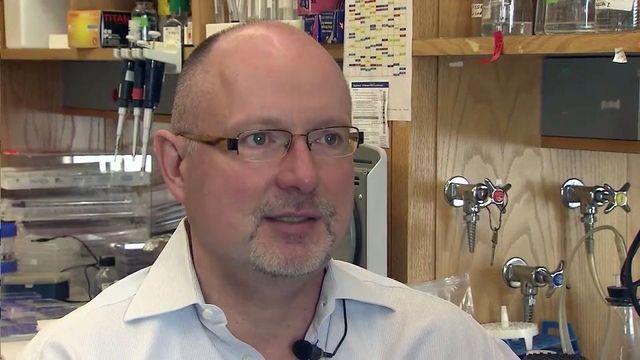Patients clamor for Duke cancer trial after '60 Minutes' report
Following a televised report Sunday of what some have called a breakthrough treatment in the fight against cancer, researchers at Duke University's Preston Robert Tisch Brain Tumor Center have been inundated by calls and emails from cancer patients wanting to take part in a clinical trial.
Posted — Updated"Glioblastoma is the most common type of brain tumor. These are tumors that arrive in the brain and they usually stay," said Dr. Matthias Gromeier, an associate professor of surgery, associate professor in molecular genetics and microbiology and associate professor of medicine at Duke. "The treatment is very inadequate. Almost all patients diagnosed with this disease eventually will die."
Gromeier has been working on the polio treatment as a potential cancer cure for 25 years. Duke also is conducting at least two other immunotherapy trials for treating brain tumors.
"These are treatments that harness the patient’s own immune system to fight the cancer," he said. "We are simply alerting our immune system to the presence of the tumor, so the infected tumor is a much better target for the immune system to recognize."
Clara Guy is a patient in one of of Duke's other immunotherapy trials. She was experiencing headaches while she was pregnant with her second child, and an MRI found a glioblastoma.
Two days after undergoing a C-section to delivery her baby, she underwent brain surgery. But the tumor later returned.
"I was basically given a life sentence – here's how much longer you can expect to live," Guy said. "Two little kids, a life ahead of us. It wasn't time for that sentence."
She is thriving with her treatment, which is in a final Phase III trial in preparation for submission to the U.S. Food and Drug Administration for approval for widespread use.
"It's like they're willing to stand there and be a cheerleader for you and say, 'No, you can make it. You can make it further,'" she said. "You have all of these potential options to help heal you, to help kill that tumor and make your life continue on."
The FDA approved a Phase I clinical study for Gromeier's treatment in 2011, and Duke has since enrolled 22 patients who had already undergone surgery, radiation and chemotherapy but still suffered from glioblastoma tumors.
While Phase I trials usually focus on determining an optimal drug dose for treatment, the Duke researchers had dramatic results.
"We have patients that have unprecedented responses, unprecedented responses because their tumors have disappeared," Gromeier said Tuesday.
Two patients in the study, who both had been given months to live a few years ago because of their glioblastomas, are now cancer-free. Several others lived long past the time doctors had predicted they would with their tumors.
"It is, of course, wonderful. I cannot say we expected that – that would be arrogant – but we were very optimistic," Gromeier said. "It shows you the strength of science. I believe we have done some very high-quality science."
The response to the "60 Minutes" report has been overwhelming, he said.
"It’s just a story that resonates because the science is so interesting," he said. "It requires a dedicated commitment towards fighting the worst type of cancers."
• Credits
Copyright 2024 by Capitol Broadcasting Company. All rights reserved. This material may not be published, broadcast, rewritten or redistributed.





